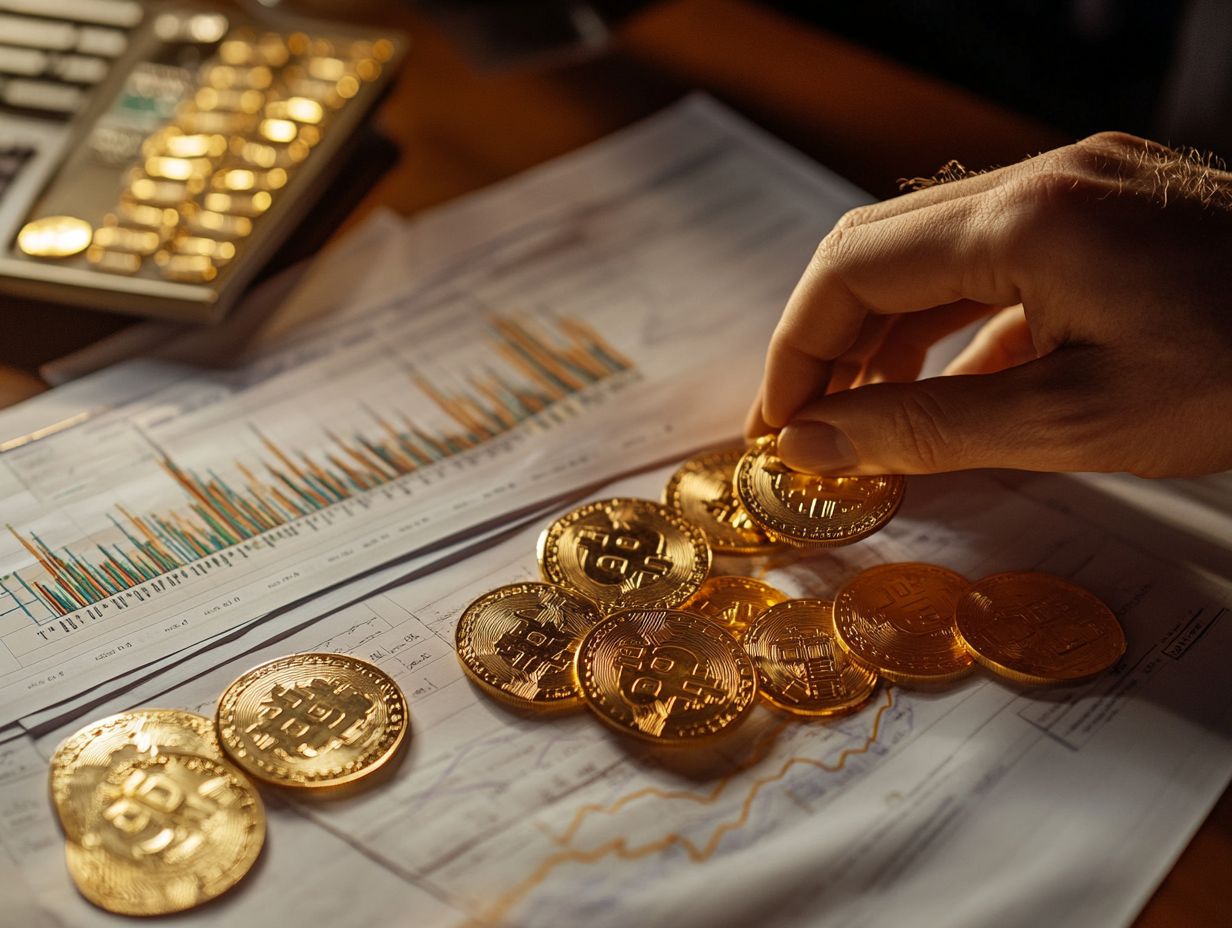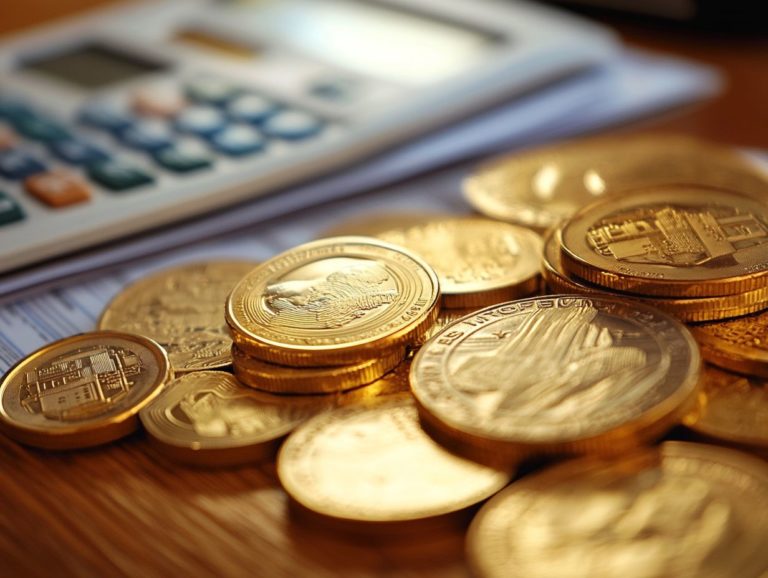How to Optimize Your Tax Strategy for Precious Metals
Navigating the world of precious metals can be an exhilarating yet complex journey, particularly when considering tax implications.
Whether you’re thinking about investing in gold, silver, or platinum, understanding the tax landscape associated with these assets is vital for making well-informed decisions.
This article explores the various types of taxes related to precious metals, the advantages of owning them, and strategies to help you maximize tax efficiency.
You’ll also discover essential tax planning insights and why collaborating with a tax professional is key to ensuring your investment remains profitable. Join us on this journey to optimize your tax strategy for precious metals.
Contents
- Key Takeaways:
- Understanding Taxation on Precious Metals
- Benefits of Owning Precious Metals
- Maximizing Tax Efficiency on Precious Metals
- Tax Planning for Buying and Selling Precious Metals
- Tax Reporting and Documentation
- Working with a Tax Professional
- Frequently Asked Questions
- What counts as a precious metal when it comes to taxes?
- What is the tax rate for selling precious metals?
- Can I deduct losses on the sale of precious metals?
- How can I minimize my tax liability when selling precious metals?
- Are there any tax-free ways to invest in precious metals?
- Do I have to pay taxes on precious metals if I keep them in my possession?
Key Takeaways:
- Understand different taxes on precious metals to plan effectively.
- Diversify your portfolio with precious metals for potential tax benefits.
- Seek professional advice to maximize tax efficiency.
Understanding Taxation on Precious Metals
Understanding how taxes apply to precious metals is crucial for your investment success, especially when navigating the complexities of capital gains, tax implications, and investment returns—particularly when considering various legal entities like limited liability companies (LLCs) and trusts.
The taxation rules for precious metals such as gold, silver, and platinum can differ markedly, influencing everything from capital gains to income tax and adherence to Internal Revenue Service (IRS) regulations.
Economic stability and historical shifts in tax rates add complexity to the subject, making it essential for you to be thoroughly informed.
Types of Taxes on Precious Metals
As an investor in precious metals, it’s essential to be aware of the various taxes that may arise. You’ll encounter capital gains tax when selling investments, income tax implications, and special considerations for collectibles.
Understanding these tax implications is crucial, especially since your tax liabilities can vary significantly depending on the type of investment—be it bullion or collectibles—and the duration for which you hold the assets. If you sell precious metals at a profit, capital gains tax will apply, and you’ll need to report those gains accurately to the IRS.
Holding these investments for over a year could qualify you for favorable long-term capital gains rates, which is certainly something to consider.
Furthermore, certain exemptions might apply based on specific conditions, helping you minimize your overall tax liability. Being well-informed about these factors empowers you to make more strategic financial decisions.
Benefits of Owning Precious Metals
Owning precious metals presents numerous advantages, including financial security, portfolio diversification, and a safeguard against the unpredictable tides of economic growth.
These benefits can significantly enhance your overall investment strategies, ensuring both stability and resilience in your financial journey.
Financial Security and Portfolio Diversification
Investing in precious metals can significantly bolster your financial security and diversify your portfolio, offering a safeguard against market volatility and inflation.
These tangible assets tend to maintain their value, especially in periods of economic uncertainty, making them an essential component of a well-rounded investment strategy. For example, during previous recessions, gold and silver have proven their capacity to appreciate when stocks and bonds struggle.
By incorporating these metals into your investment portfolio, you have the potential to enhance your overall returns over time, as they often move inversely to market trends.
Owning physical assets like bullion or coins also gives you the power to hedge against currency devaluation, ultimately fostering greater financial resilience.
Act now to secure your financial future with precious metals. Consulting a tax professional can provide personalized advice tailored to your unique situation.
Maximizing Tax Efficiency on Precious Metals
Maximizing tax efficiency on precious metals requires you to employ a range of smart strategies aimed at minimizing tax liabilities while maximizing deductions.
By doing so, you can significantly enhance your overall investment returns.
Strategies for Reducing Tax Liability
To effectively reduce your tax liability on precious metals, consider adopting tax-efficient strategies such as thoughtful planning, understanding available deductions, and managing profits wisely.
With smart tax planning, you can find deductions that cut down your taxable income. Familiarizing yourself with IRS regulations is crucial for navigating the intricate rules surrounding the sale of precious metals. This knowledge helps you avoid potential pitfalls and enhances your overall tax efficiency.
Keep your records sharp and ready! This not only helps with your taxes but also gives you peace of mind. Meticulous documentation of all transactions, purchases, and sales is essential for accurately reporting gains and substantiating your claims in case the IRS questions any of your filings.
These efforts can lead to significant savings and a more favorable financial outcome for you.
Tax Planning for Buying and Selling Precious Metals
Effective tax planning for purchasing and selling precious metals demands a nuanced understanding of timing, holding periods, and the tax obligations that can profoundly influence your investment outcomes. By navigating these complexities with care, you can optimize your strategy and enhance your financial results.
Timing and Holding Period Considerations
When you buy and sell precious metals matters. This timing affects whether your gains are short-term or long-term. The timing of your transactions and the holding period can significantly impact your capital gains outcomes.
It’s crucial to remember that short-term gains—those from assets held for one year or less—are taxed at ordinary income tax rates, which can be notably higher than the rates for long-term capital gains. On the flip side, assets held for more than a year enjoy preferential tax treatment, allowing you to keep more of your hard-earned profits. This makes strategic timing in transactions vital; by carefully planning when to sell your assets, you can optimize your returns and minimize your tax liabilities.
Grasping the implications of these classifications not only enhances your financial decision-making but also underscores the necessity of a well-structured investment strategy.
Tax Reporting and Documentation
Ensuring proper tax reporting and documentation for your precious metals investments is essential for compliance with IRS regulations. This includes the meticulous completion of Form 1040 and Schedule D, which are used to report your income and any gains or losses.
Taking these steps will help you navigate the complexities of tax obligations with confidence.
Requirements for Reporting Precious Metals on Taxes
Understanding the requirements for reporting precious metals on your taxes means getting acquainted with IRS guidelines, especially the details you’ll need for Form 1040 and Schedule D.
This involves accurately reporting any gains or losses from the sale of these assets, which can be quite a task, requiring you to track purchase prices and sale proceeds meticulously. You’ll want to ensure you have all the necessary documentation, like receipts or sales reports, to back up your claims.
Common pitfalls during this reporting process can include:
- Failing to report transactions exceeding a threshold.
- Misclassifying types of metals sold.
- Neglecting associated costs like commissions.
Being thorough and keeping your records organized can significantly reduce the chance of errors and help you stay compliant with tax regulations.
Get started on your tax efficiency journey today—your wallet will thank you!
Working with a Tax Professional
Hiring a tax professional or financial advisor is an essential move for you as an investor in precious metals. With expert guidance, you can easily stay compliant with intricate regulations while optimizing ways to minimize your tax burden tailored specifically to your unique circumstances.
Importance of Seeking Professional Advice
Professional advice from a tax expert or financial advisor can significantly enhance your understanding of tax planning and compliance requirements for your precious metals investments. These professionals bring a wealth of knowledge about the ever-changing tax landscape.
They help you navigate the intricacies of buying, selling, and holding precious metals. With their tailored insights, they clarify the specific tax implications relevant to your financial situation, ensuring your investments align seamlessly with both your short-term goals and long-term strategies.
They can also identify potential deductions, credits, and strategies to defer tax liabilities, empowering you to make informed decisions that maximize your returns. By engaging a tax professional, you’re equipping yourself to manage your tax obligations more effectively, ultimately paving the way for a more secure financial future.
Frequently Asked Questions
What counts as a precious metal when it comes to taxes?
Precious metals include gold, silver, platinum, and palladium. These are considered commodities and are subject to taxation based on their market value.
What is the tax rate for selling precious metals?
The tax rate for selling precious metals varies depending on your income and the type of metal. Generally, it is taxed as a capital gain, with rates ranging from 0% to 39.6%.
Can I deduct losses on the sale of precious metals?
Yes, you can deduct losses on the sale of precious metals from your taxable income. However, there are limitations, and it is best to consult with a tax professional for specific advice.
How can I minimize my tax liability when selling precious metals?
Don’t wait! Hold onto your precious metals for over a year to take advantage of lower tax rates, which can qualify you for long-term capital gains rates.
Are there any tax-free ways to invest in precious metals?
Yes, one option is to invest in a gold IRA, which allows you to use pre-tax dollars to purchase physical gold, silver, platinum, or palladium. This can help minimize your tax liability in the long run.
Do I have to pay taxes on precious metals if I keep them in my possession?
Yes, you are still responsible for paying taxes on the market value of your precious metals, even if you keep them in your possession. It is important to keep accurate records of your purchases and sales for tax purposes.



















